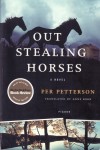Out Stealing Horses by Per Petterson (2003. 2005-English Translation. Pickador. ISBN 978-0-312-42708-5)
I haven’t read any of Swedish phenom, Stieg Larsson’s, crime novels but I have read (and reviewed) plenty of Finnish crime novels for the New World Finn. Of course, I’ve also read the classic Scandinavian American author, Ole Rolvaag, his German American protege, Herbert Krause, and Halldor Laxness’s beautifully executed novel of Iceland, Independent People. I’ve also written my own historical novel of the Finns coming to North America (Suomalaiset: People of the Marsh) and I’m in the process of writing a similarly broad shouldered historical novel set in Estonia, Karelia, and Finland (Sukulaiset: The Kindred). So when my friend, Dave Michelson, made a special trip out to the Munger place to drop off his copy of Petterson’s slender novel, I was going into the “read” with a fair bit of knowledge about Scandinavian literature. I knew the tale would likely be dark. I knew the protagonist would likely be male. I knew that there had to be some tragedy involved (of course, what good novel could exist absent tragedy?). These things were a given. But the bare-bones quality of Petterson’s little fable, the nuanced revelations of plot: these things were not so obvious until I sat down and devoured the book.
I found myself reading Trond’s confession (a back and forth tale of a young boy, now an old man, living a summer, and now, at the end of his time, in the forests of northern Norway) mostly on the covered front porch of my house. Every time I cracked open the book’s spine, I found myself facing the biggest and boldest white pines on our property, sipping on a glass filled with ice and cold water, and considering the ever-present heat and humidity stalled above the Cloquet River. Some inner compass, some subconscious drive, required me to be oriented to my family’s land in the same way Trond is oriented to the woodlands and the river integral to his story.
A long-winded discussion of what Petterson does right in this book should be left to the academics. Suffice it to say, the author paints a very stark and minimalist landscape (both real and internal) with his words, but one with such texture and point of view that it always captivates and always urges the reader on. Though this is a tale told by an old man chronicling portions of his life journey, the female characters are fully realized and important to the plot. This may be a man’s book, written from a man’s point of view, but the women, though secondary characters, are not short changed and are integral members of the cast.
Lyrical and poetic in the best Scandinavian tradition, this book is, quite simply, amazing.
5 stars of 5.




